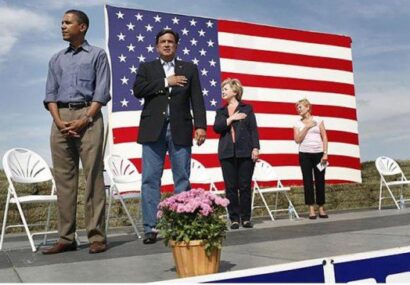TORONTO — A U.S. soldier facing deportation after fleeing to Canada to avoid the war in Iraq said Friday that her biggest fears are being separated from her children and being sent to prison upon her return to the United States.
Kimberly Rivera, who has lived in Canada for five years with her husband and four children, was issued a deportation order earlier this week. Citizenship and Immigration Canada has given her until Sept. 20 to leave the country.
“I’m just overwhelmed. I don’t want to face reality. I respect Canada’s laws and I will still proceed with what it is that I have to do, but I’m trying to take it one step at a time so I don’t have meltdowns like earlier,” said Rivera, who stepped away during a press conference Friday when she became visibly upset.
Rivera’s lawyer, Alyssa Manning, said her client is considering appealing the deportation ruling.
“The 6 percent of (war) deserters who are punished through incarceration include service personnel who have been publicly outspoken about their criticisms of the Iraq war while AWOL. The government has failed to assess that risk that Kim faces and that needs to be considered,” said Manning.
Rivera, a 30-year-old Army private, served in Iraq in 2006. She said she became disillusioned with the mission. She crossed the border into Canada while on leave in February 2007, after she was ordered to serve another tour there.
After arriving in Canada on leave, she applied for refugee status.
The Liberal government in office at the time of the war in Iraq chose not to join the invading coalition.
The current Conservative government has said that military deserters from the United States are not genuine refugees under the internationally accepted meaning of the term. Furthermore, Immigration Minister Jason Kenney’s spokeswoman, Alexis Pavlich, said it does not believe that President Obama’s administration will subject American soldiers to persecution.
However, Manning said there is an arrest warrant out for Rivera and she will be immediately arrested upon crossing the border and put into a county jail until the military can pick her up. Manning said she will then likely be taken to Fort Carson, Colo., where she was stationed, where she’ll be detained until she faces court-martial.
Manning said she anticipates Rivera could face a jail sentence of between two to five years.
Rivera has also applied for permanent residency in Canada based on humanitarian and compassionate grounds, which she hoped would take into account the fact that she has four children, ages 10, 8, 3, and 18 months, the youngest of which were born in Canada.
She did not receive a decision on that application, which was submitted three years ago. Manning said they will also ask for a deferral of the deportation order until a decision on that application is submitted.
If Rivera appeals the deportation order, it will be the second time she will attempt to fight being forced to return to the U.S. In January of 2009, Canada’s Immigration and Refugee Board ordered her and her family to leave the country or face deportation. Rivera appealed that decision.
The War Resisters Support Campaign, which notes that there are approximately 200 Iraq war resisters in Canada, said two other Iraq war resisters who were deported, Robin Long and Clifford Cornell, faced year-long jail sentences upon their return.
Long was given a dishonorable discharge in 2008 and sentenced to 15 months in a military prison after pleading guilty to charges of desertion.
The lower house of Canada’s Parliament passed a nonbinding motion in 2009 urging that U.S. military deserters be allowed to stay in Canada, but the Conservative government ignored the vote.
During the Vietnam War, up to 90,000 Americans won refuge in Canada, most of them to avoid the military draft. Many were given permanent residence status that led to Canadian citizenship, but the majority went home after President Jimmy Carter granted amnesty in the late 1970s.
























